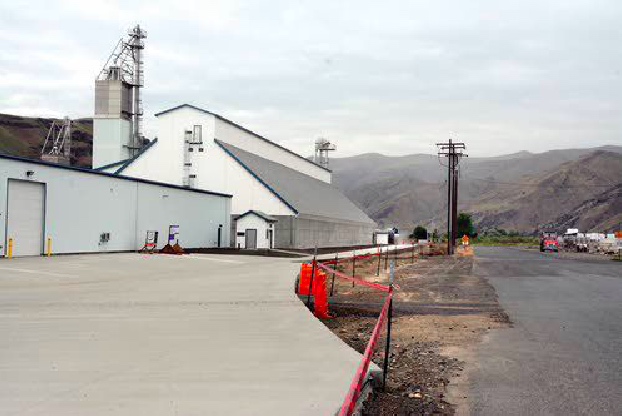forum
library
tutorial
contact

Fertile Ground
by Elaine WilliamsLewiston Tribune, June 5, 2016
|
the film forum library tutorial contact |

|
Fertile Groundby Elaine WilliamsLewiston Tribune, June 5, 2016 |
McGregor Co. manager Fred Morscheck discusses major upgrades at Port of Wilma
that improve convenience while cutting costs for region's farmers
 McGregor Company's new multimillion-dollar complex at the Port of Wilma just west of Clarkston is aimed at making delivery of liquid fertilizer to farmers as easy as filling up the gas tank of a pickup truck.
McGregor Company's new multimillion-dollar complex at the Port of Wilma just west of Clarkston is aimed at making delivery of liquid fertilizer to farmers as easy as filling up the gas tank of a pickup truck.
Account managers place orders for farmers. Once the order is in the McGregor system, they can drop by any time the complex is open and fill up their trucks with fertilizer blends containing as many as eight nutrients.
Once they enter their code, the system pulls up the account and knows exactly what goes into each blend and how much each farmer needs, said Fred Morscheck, general manager of marketing and logistics for McGregor Company.
After that, it's just a matter of farmers connecting their trucks, Morscheck said. "It's a little daunting when folks come to get their first load. But once truck drivers make a few trips through the facility, they catch on very quickly."
Eventually the site, which is monitored by dozens of cameras, will be open around the clock, with entry being controlled by gate pass codes. The easy access is just one of the many upgrades the facility has over the one it replaced just west of Moscow, Morscheck said.
It wasn't unusual to see four or five trucks there waiting to load, Morscheck said. "We were at a breaking point in terms of trying to keep up with demand."
Business Profile talked with Morscheck about the company's latest addition, how Alex McGregor is preparing the next generation in his family to run operations and what we can expect out of this year's wheat crop.
Business Profile: What more can you share with us about this complex?
Fred Morsheck: It's the single largest investment McGregor has ever made in its history. The whole concept was designed to serve today's large-scale farms. Back when I was growing up in the 1960s, my family farmed 670 acres near Genesee. Now farms in this region are anywhere from 2,500 to 3,000 acres and are getting larger every day.
McGregor started by leasing the land in 2008 from the Port of Whitman County (which owns the Port of Wilma). Construction began in 2012 with soil stabilization in key areas of the site. In 2013, we constructed six, 550,000-gallon tanks and three 65,000-gallon tanks and have the ability to add as many as a million more gallons of storage in the future.
We built 2,700 feet of rail tracks. We constructed a 48,000-square-foot warehouse for dry soil fertilizers such as phosphorous and nitrogen. Trains or trucks drop their loads into a pit with an underground conveyor belt that leads to a 75-foot elevator that takes the products into the building. A conveyor belt, which runs the entire length of the 400-foot building, drops product into 11 bins. This system can unload 300 tons per hour, compared with 100 tons per hour at the one it replaces.
We also have a 6,000-square-foot manufacturing plant. We heat water and make specialty blends with nitrogen and other nutrients. This is much more cost-effective for our customers, because we used to source these products from the Tri-Cities. These products have a lot of water, so the transportation expense was high.
BP: What happens to the site along the Moscow-Pullman highway that this replaces?
FM: We don't know yet. We're going to try and find an alternative use for it. We did not do the expansion there because of the advantages of being on the river and concern over the viability of rail to that location.
BP: Ian McGregor, Alex McGregor's son and a vice president, will lead McGregor when his dad, who is in his mid-60s, retires. How has Ian McGregor been involved in the company?
FM: I want to direct this one to Ian.
Ian McGregor: I started helping out at the ranch at about age 10. I graduated to working in the company's equipment division around age 12, primarily painting parts of fertilizer applicators, building harrow sections, sandblasting and counting inventory. I started full time with the company 12 years ago in our information technology department, which I later managed. Currently I am the company vice president. My duties include overseeing our strategic direction, mergers and acquisitions. I provide oversight of our retail operations, technology, finance and safety teams. As president, my dad provides leadership to our overall team, outreach with customers and other stakeholders. He also serves as a voice for agricultural government and policy organizations.
BP: What do you expect to see with wheat prices this year?
FM: The biggest driver will be weather globally. Around here, most farmers have about one-third of their crops in winter wheat, one-third in spring wheat and the remainder in peas, lentils or garbanzos. Most places had some damage to their winter wheat because we had some very cold weather early on when there wasn't any snow cover. It's a long way to harvest. If we get the spring moisture as we're predicted to, this area has a tremendous ability to recover from a rough winter start. With spring wheat, it's too early to make any predictions. It relies more on timely rains.
Related Pages:
Much More McGregor by Elaine Williams, Lewiston Tribune, 10/6/13
learn more on topics covered in the film
see the video
read the script
learn the songs
discussion forum
